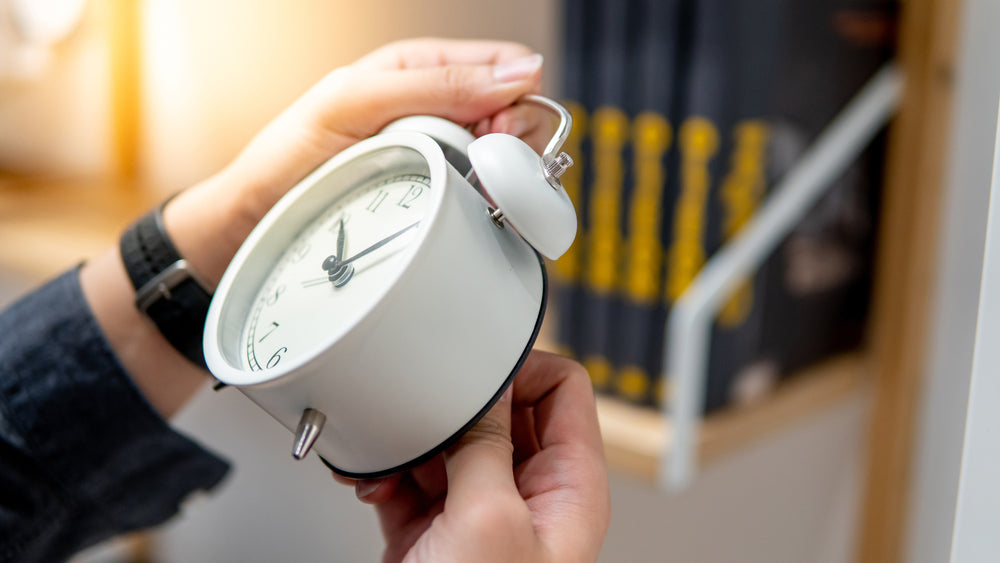Free U.S. Shipping On Orders Over $150

How Daylight Saving Time Impacts Your Sleep and Health (Plus Tips on How to Cope)
Posted on
Daylight savings time is a controversial practice. It was implemented as an effort to take advantage of longer days in spring and summer, but shifting the clock forwards and back can have an impact on our sleep and health.
At best, daylight savings time is annoying and tedious. At worst, it has been linked to a possible rise in heart attacks and fatal car accidents when clocks are pushed forward.
In this post, we take a look at how Daylight Saving Time (DST) affects our circadian rhythm and sleep quality.
Daylight Saving Time and Our Circadian Rhythm
The primary effect of DST is that it upends our circadian rhythm. This is the rhythm that governs your sleep wake cycle. It tells your body when to sleep and when to wake up.
When we push the clocks forward by an hour in spring, this disrupts the sleep-wake cycle we are used to. You suddenly have to wake up when your body feels it should still be asleep and go to bed earlier than you are used to.
Most of us eventually adapt to the new cycle and the negative effects fade after a few weeks. But then fall arrives and you have to turn the clock back an hour. This whacks our circadian clock once again and affects sleep.
Fall disruption is usually not as bad as the one in spring, but it can still take a few days to get used to the new time.
How DST Time Changes Affect Our Sleep
Spring Forward
The biggest impact of the interruption in circadian rhythm is to sleep. When clocks are pushed forward in spring, many people complain of feeling sleepy, increased fatigue and trouble falling asleep in the evening.
The most notable sleep disruption occurs on Monday following the change in time. Most people lose anywhere between 40 minutes and 1 hour of sleep, hence the complaints about daytime fatigue and sleepiness.
Sleep deprivation can persist over the next few days, though in smaller amounts. But the cumulative loss of sleep over days can leave you feeling tired, irritable and struggling with things like memory and concentration.
Temporary insomnia is also a common effect of DST. The forward shift in time means you have to go to bed earlier than you are used to. This can leave you feeling alert and restless at bedtime and can worsen sleep deprivation.
Fall Back
In the fall, we go back to standard time. This means we gain an hour of sleep. In fact, the change back to standard time leaves most people feeling more rested and refreshed.
But for some people, the change in their wake-sleep cycle can still cause sleep disruptions and deprivation. You may find yourself waking earlier than you need to and feeling sleepy too early in the evening.
Does Daylight Saving Time Affect Our Health Too?
DST clearly affects our sleep. But does it do more than that?
Yes, it probably does. Disruptions to the circadian rhythm can affect other parts and systems of the body that rely on this internal clock. The lack of adequate sleep is also associated with various health problems.
Several studies have linked the shift in time to an increased risk of heart attack, stroke, increased inflammation, higher stress levels and various mood and mental disorders.
DST changes in the spring may also be responsible for an increase in injuries and deaths on the roads and in work places. Sleep disruption causes issues with performance, focus, concentration and response.
In the fall, clocks are turned back and we lose an hour of daylight. So people tend to drive more in the dark, causing an increase in accidents.
How to Cope With Daylight Saving Time
Here are some tips to help you adapt quicker to DST and minimize sleep disruptions.
- Make changes to your sleep routine a few days before clocks are changed. In the spring, start sleeping and waking up earlier. In the fall, start sleeping later and waking up later. By the time DST arrives, your circadian rhythm will have adapted. Adjust your sleep time by 15 minutes initially then add 15 minutes every two days.
- Take short naps if you feel sleepy during the day. They will help reduce sleep debt. A 20-30 minute nap is enough to get your energy levels and mental sharpness back up.
- In the spring, get some sunlight exposure as soon as you wake up. It will help you feel more alert and help your circadian clock adapt faster.
- Once you have adapted to the new cycle, maintain the same sleep routine every night. Do not be tempted to stay up late or sleep in.
- Exercising can also help you adapt to a new sleep-wake cycle. Being active during the day keeps your body alert and makes it easier to sleep at night.
In addition to changing time, you also have to deal with longer days in the spring (and summer). The extra minutes of sunlight can interrupt your sleep. Use blackout curtains or wear a sleep mask to prevent light from disrupting your sleep.
Final Thoughts
Of course, you can also decide to ignore daylight saving time and move along on standard time. This is possible if you have control over your schedule.
But if you are employed or run a business, you just have to go along with DST and find ways to cope with its disruptions.
Quick links
Contact
6063 Hudson Road #160
Woodbury, MN 55125
Yo@hercLeon.com
Leave a comment: